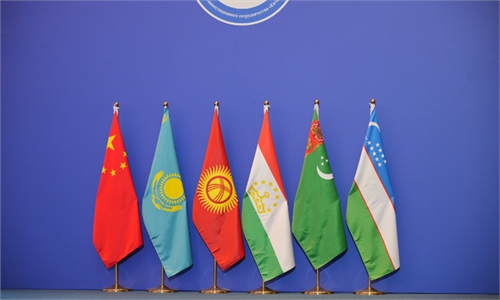Xi'an summit ushers in a new era of cooperation and development of China-Central Asia ties

Illustration: Liu Xidan/GT
The China-Central Asia Summit will be held on Wednesday and Thursday in Xi'an, Northwest China's Shaanxi Province. This summit is China's first major diplomatic activity that China hosts in 2023 and the first summit held offline by the heads of state of the six countries since the establishment of diplomatic ties 31 years ago. This summit is of great significance, as it marks another milestone in China's relationship with Central Asia and China and the Central Asian countries will work together to open a new era of cooperation and development.
Central Asian countries are not only China's neighbors and fellow developing countries, but also core members of the Shanghai Cooperation Organization, occupying an important position in China's diplomacy. Since the establishment of diplomatic relations between the two sides 31 years ago, cooperation has continued to deepen in various fields such as politics, economy, security, culture, and international affairs, yielding fruitful results, promoting their respective development and prosperity, and effectively contributing to maintain regional peace and stability. This summit not only continues the tradition of relations, but also demonstrates new characteristics, reflecting the core values of a new type of international relations in the following aspects:
First, head-of-state diplomacy will become a pivotal way to strengthen strategic mutual trust between China and Central Asia, and deepen the relationships between countries on the basis of equality and mutual respect. Heads of state will jointly sign an important political document at the summit, and under the series of consensus reached between them, the two sides will efficiently carry out multi-level and all-field exchanges and cooperation, continuously enhancing the depth and breadth of exchanges between governments, political parties, and local levels of China and Central Asian countries.
Second, independence and autonomy are the key concepts for China and Central Asia to carry out cooperation based on respective interests, and the friendly and neighborly relations between the two sides reflect the principles of democratization of international relations. China and Central Asia's relationship is not based on ideology or geopolitical boundaries, but on mutual respect, supporting the sovereignty and territorial integrity of all parties, and respecting each country's exploration of development paths that suit their national conditions. This ensures that the goals of cooperation focus on the future development of each country, making them reliable and dependable strategic partners for each other.
Third, economic and trade cooperation is the cornerstone of the development of relations and the realization of regional prosperity, and it will be a key area for countries to implement the principle of win-win cooperation. Economic development is of paramount importance for countries to achieve long-term stability and security. China and Central Asian countries are both developing countries, and economic development is the most fundamental demand of them, as well as the fundamental guarantee for achieving political and social goals. The two sides can leverage their geographical proximity to further enhance connectivity, improve trade facilitation, enhance the "quality" and "quantity" of economic and trade cooperation, and achieve mutual benefits.
China and Central Asia are adjacent in terms of geography and are closely related in terms of their development and security. This summit is expected to deepen relations, strengthen cooperation, improve China-Central Asia cooperation mechanisms, and promote the construction of a closer China-Central Asia community with a shared future. This will help promote common development, mutual security, peace and stability, and good neighborly relations as well as have a positive impact on the regional situation in politics, economy, security, culture, and other aspects.
To further deepen ties, the two sides need to promote common development. Building a China-Central Asia community with a shared future helps China and Central Asia to closely coordinate and cooperate under bilateral and multilateral mechanisms, reject zero-sum thinking, enhance practical regional cooperation, promote more tangible results, expand the intersection of interests among countries, and achieve common development.
The two sides need to ensure mutual security. It is conducive to strengthening dialogue and communication among countries, enhancing mutual trust and understanding, coordinating the demands of each country, managing differences, combining each country's own security with common security, and adhering to mutual achievements and win-win cooperation.
The two sides need to maintain regional peace. It helps the two to strengthen unity and cooperation on regional security issues, effectively resist the spillover risks of external threats to the region, prevent and resolve internal crises in the region, and ensure regional peace and stability.
The two sides need to enhance a neighborly friendship. It is beneficial to strengthening the linguistic and cultural connections in the region, expanding the channels of communication for cultural exchanges, deepening countries' understanding and recognition of each other, promoting linguistic communication, cultural integration, close people-to-people ties, and mutual learning.
The author is PhD candidate at the Institute of Russian, Eastern European and Central Asian Studies at Chinese Academy of Social Sciences. opinion@globaltimes.com.cn


